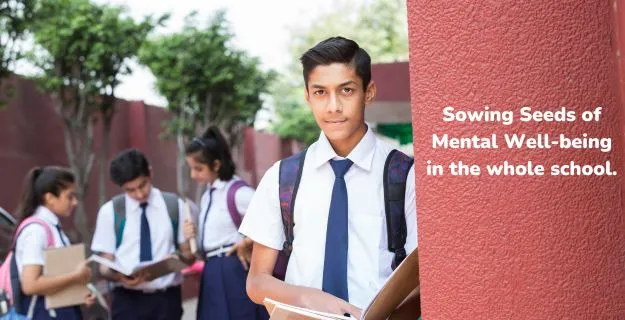Prioritizing mental well-being in the school environment benefits everyone – students, teachers, and staff. Let’s delve into practical strategies to cultivate a supportive atmosphere that promotes mental wellness across our school community.
A – Anchoring Well-being Principles:
- Wellness Policies: Developing and implementing wellness policies that encompass mental health lays a solid foundation for well-being initiatives. These policies outline our commitment to mental wellness and provide guidelines for promoting it throughout our school.
- Mindful Mission: Integrating mindfulness into the school’s mission statement emphasizes the importance of mental well-being as a core element of the educational experience. This serves as a constant reminder of our dedication to nurturing the well-being of every member of our school community.
- Training and Awareness: Providing mental health awareness training for all staff equips them with the knowledge to recognize signs of mental health challenges and offer appropriate support. By increasing awareness, we empower our staff to create a supportive environment where individuals feel valued and understood.
B – Blossoming in the Classroom:
- Mindful Education: Incorporating mindfulness practices into the curriculum, such as deep breathing exercises, mindfulness activities, and relaxation techniques, benefits both students and educators. These practices help reduce stress, improve focus, and enhance overall well-being, creating a conducive learning environment.
- Positive Classroom Culture: Creating a positive classroom environment through open dialogue, empathy, and respect fosters a supportive space for everyone. Teachers can encourage a culture of kindness, inclusion, and support, where students feel safe to express themselves and seek help when needed.
- Peer Support Programs: Offering peer support programs allows students to connect and help each other, building a sense of community and understanding. Peer support groups, buddy systems, or mentoring programs provide opportunities for students to share experiences, offer encouragement, and receive support from their peers.
C – Community Connections:
- Parental Involvement: Engaging parents in mental well-being initiatives by sharing resources, organizing workshops, and fostering collaboration in supporting students’ mental health. Parents play a crucial role in supporting their children’s well-being, and involving them in school initiatives creates a collaborative approach to promoting mental wellness.
- Community Partnerships: Establishing partnerships with mental health organizations, local community centers, and counseling services provides valuable resources and support for the entire school community. These partnerships can offer workshops, counseling services, and educational programs to enhance mental health literacy and support.
- Well-being Events: Organizing events dedicated to mental health awareness contributes to a shared understanding of its importance and provides resources for support. Well-being fairs, guest speakers, and themed weeks or months focused on mental health create opportunities for education, dialogue, and support within the school community.
Why It Matters: Impacting the Entire School Community
- Healthy Learning Environment: Prioritizing mental well-being creates a positive environment for learning, contributing to improved academic performance, attendance, and overall satisfaction among students, teachers, and staff.
- Staff Retention and Satisfaction: Supporting staff in their mental well-being positively impacts retention rates and their contribution to the school community. When educators feel supported and valued, they are more likely to stay and provide quality education to students.
- Holistic Growth: Focusing on mental well-being supports not only academic growth but also the overall development of students, preparing them for challenges beyond the classroom. By promoting resilience, emotional intelligence, and coping skills, we empower students to navigate life’s challenges with confidence and resilience.
The Ripple Effect: Flourishing Minds Beyond the Classroom
- Positive School Culture: A focus on mental well-being shapes a positive and inclusive school culture where everyone feels valued, supported, and respected. This culture extends beyond the classroom, influencing interactions, relationships, and attitudes within the school community.
- Life-Long Well-being Skills: Developing essential well-being skills extends beyond school years for students, educators, and staff. By fostering resilience, self-awareness, and coping strategies, we equip individuals with lifelong skills to navigate challenges and thrive in their personal and professional lives.
- Community Impact: A mentally healthy school community positively impacts the broader community, contributing to societal well-being and understanding. By promoting mental wellness and reducing stigma, we create a culture of empathy, support, and acceptance that extends beyond our school walls.
The timing for nurturing a school community where everyone can flourish and thrive has never been better, given the growing recognition of the significance of mental well-being and the collective desire to create supportive environments for all.



